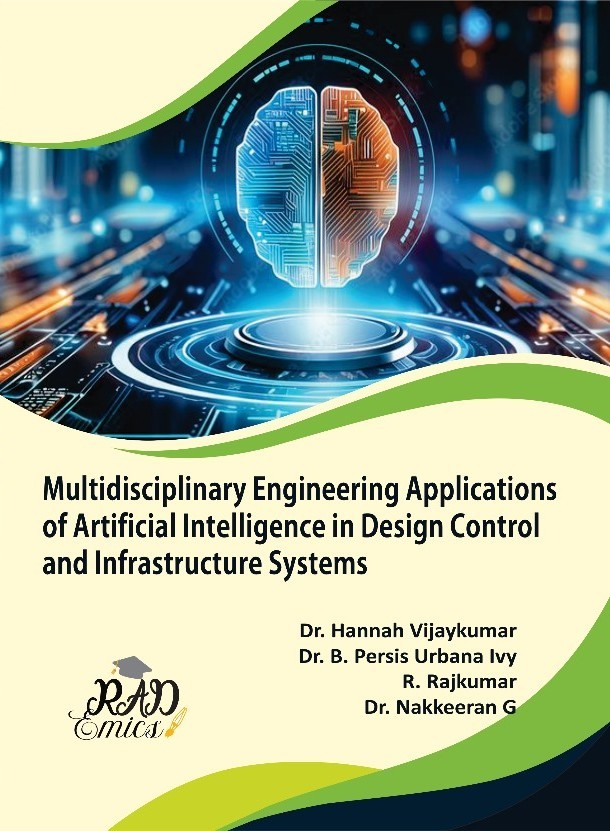
Author Name : S Mani Kuchibhatla,K.B. Anusha, Sangita Gautam Lade
Copyright: ©2025 | Pages: 36
DOI: 10.71443/9789349552609-17
Received: 12/03/2025 Accepted: 28/05/2025 Published: 06/09/2025
The rapid advancement of Artificial Intelligence (AI) has transformed the landscape of engineering design, particularly in the context of sustainable practices. This chapter explores the integration of AI-driven multicriteria decision-making (MCDM) techniques in real-time engineering decision-making processes, with a focus on enhancing sustainability, efficiency, and adaptability. AI’s ability to process vast streams of data in real time provides engineers with powerful tools for optimizing design decisions that account for multiple, often conflicting, sustainability criteria. By merging AI algorithms with traditional MCDM methods, engineers are empowered to make more informed and dynamic choices across diverse engineering disciplines, such as energy systems, manufacturing, and civil infrastructure. The chapter delves into the application of adaptive algorithms for processing real-time data, improving decision accuracy and responsiveness in dynamic environments. Furthermore, it addresses the challenges and opportunities inherent in this evolving field, including ethical considerations, data privacy, and the socio-economic impact of AI-driven decision-making. Through comprehensive analysis and case studies, this work highlights the potential of AI to address pressing global challenges, from reducing environmental impact to enhancing societal equity. Ultimately, this chapter serves as a critical resource for both researchers and practitioners seeking to integrate AI into sustainable engineering design frameworks, offering insights into the future direction of the field.
Sustainable engineering design has become a key focal point in addressing the environmental and societal challenges faced by modern industries [1]. With the growing recognition of climate change, resource depletion, and socio-economic disparities, engineering design is increasingly expected to contribute to solutions that not only meet technical and economic objectives but also enhance environmental stewardship and social well-being [2]. Engineering design processes were centered around optimizing performance, cost, and time constraints [3]. The need to incorporate sustainability into design decision-making has led to the adoption of frameworks that consider a broader spectrum of criteria [4]. These frameworks aim to balance conflicting priorities such as environmental impact, resource efficiency, cost-effectiveness, and social responsibility, ensuring that engineering projects align with long-term sustainable development goals [5].
Multicriteria Decision-Making (MCDM) techniques have emerged as a powerful tool in this context, enabling decision-makers to evaluate multiple design alternatives based on a variety of sustainability criteria [6]. MCDM helps prioritize the most optimal solutions by systematically weighing and comparing different factors, providing a structured approach to decision-making [7]. Traditional MCDM methods often struggle to account for the complexity and dynamic nature of real-world engineering problems [8]. As sustainability challenges become increasingly intricate and multifaceted, the need for more advanced, adaptive decision-making systems has become clear [9]. This is where Artificial Intelligence (AI) plays a crucial role, offering significant advantages in handling large-scale, complex data and enhancing decision-making processes [10].
AI-driven MCDM techniques integrate machine learning, optimization algorithms, and real-time data analysis to provide engineers with more accurate, adaptive, and scalable decision-making models [11]. By utilizing AI, engineers can make decisions that consider multiple factors simultaneously, from environmental impact and energy efficiency to social equity and economic feasibility [12]. AI models can process vast amounts of real-time data, offering insights into changing conditions and optimizing decisions accordingly [13]. This real-time adaptability is especially valuable in fast-paced, dynamic environments where design parameters constantly shift, such as in smart cities, renewable energy systems, and advanced manufacturing processes [14]. The integration of AI with MCDM, therefore, represents a leap forward in addressing sustainability challenges with greater precision and flexibility [15].